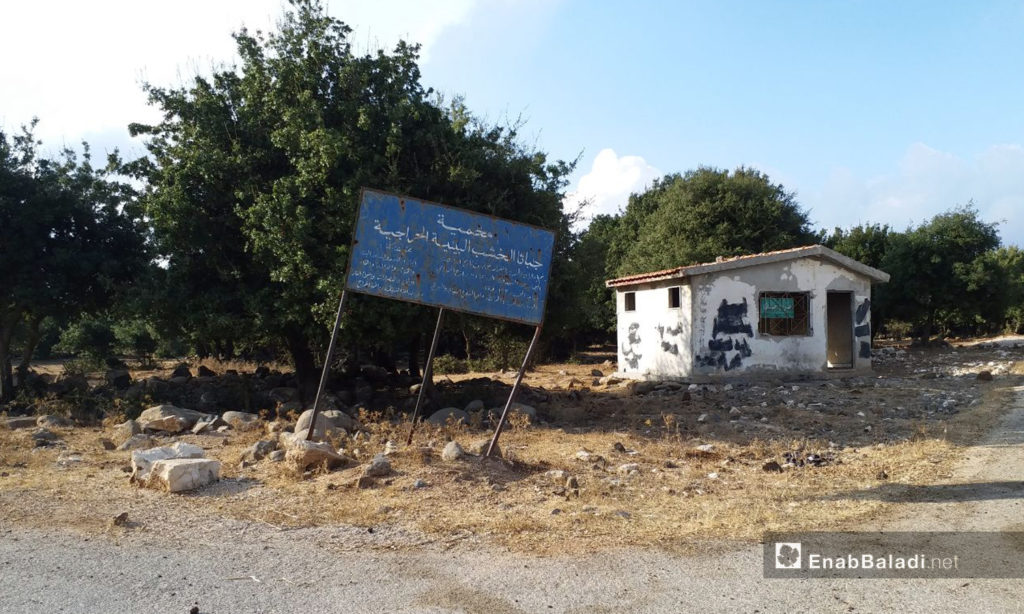Enab Baladi – al-Qunaytirah
On the southern foothill of Mount Hermon (Jabal al-Shaykh) in al-Qunaytirah province, thousands of oak trees are scattered in a “natural reserve” that has been endangered for years. This reserve is located in the midst of a continuing “war” with Israel and other wars that the Syrian regime has begun in response to the opposition.
After the 2018 “settlement” agreement between the Syrian opposition and regime under Russian auspices in the southern Syrian governorates, with the return of services to villages and towns and activating institutions’ work, the Directorate of Agriculture and Forestry Service’s forest outpost was back to work.
Once again, forestry protection laws became applicable to residents, most of whom have kept their forestry from being damaged and lost in a climate of impunity.
The protection group “saved” the forest
“Abu Abdo,” a former employee of the Trinjah forest outpost, together with nine of his friends, “protected the forest” after his official work ceased since his village in the northern al-Qunaytirah countryside participated in the protests that began in 2011.
The young man told Enab Baladi that their daily tasks included preventing overgrazing, supervising firewood cutting, and constant monitoring of trees.
He added that he and his friends took care of pruning trees and helping people to get the firewood needed without damaging the forest.
“Abu Mohammed,” a man in his fifties from Jubata al-Khashab town, told Enab Baladi that he forgets “his worries and all life’s concerns” whenever he inhales the forest’s fresh air, beholds its trees, and hears the sounds of its birds.”
Abu Mohammed added that “the forest” provided protection to the residents upon the advancement of the regime’s forces “because of the density of trees,” though it did not block the constant shelling of the “demilitarized zone.”
The forest also allowed the townspeople to bear the winter cold by cutting firewood under specific laws.
Abu Mohammed pointed out that this reserve is the “only survivor” of random logging in al-Qunaytirah due to the residents’ interest in preserving its trees.
Over an area of 133 hectares (1,330,000 square meters), there are more than 30,000 trees of oak, hawthorn, wild plums along with squirrels, rabbits, foxes, deer, sparrowhawks, owls, blackbirds, and quail birds.
The reserve is surrounded by Jubata al-Khashab town to the south and west, Ovania village to the east, and Trinjah forest to the north. It has about 100 plant species such as sumac, wild mint, capers, and chamomile, which grow on their red basaltic soil.
According to Syria’s Ministry of Agriculture and Agrarian Reform’s statistical data, the total area of forests and forestry registered in 2018 in al-Qunaytirah is 3,401 hectares (34,010,000 square meters).
The industrial afforestation area is 2,026 hectares (20,260,000 square meters) distributed among about 30 forest sites. The natural forest spreads over an area of 655 hectares (6,550,000 square meters) and includes the Breiqa and Bir-Ajam forests along with the Jubata al-Khashab forest, “which were uprooted entirely during the war,” according to the official Syrian Arab News Agency (SANA).
The damage to natural forests and forestry sites during the war was estimated by the Directorate of Agriculture and Agrarian Reform of al-Qunaytirah province in December 2018 to be 552 million Syrian pounds (SYP = 1.1 million USD).
According to the department’s officials’ statements to SANA “, the governorate’s afforestation plan includes the restoration of 130 hectares (1,300,000 square meters) of natural and industrial forest sites.

